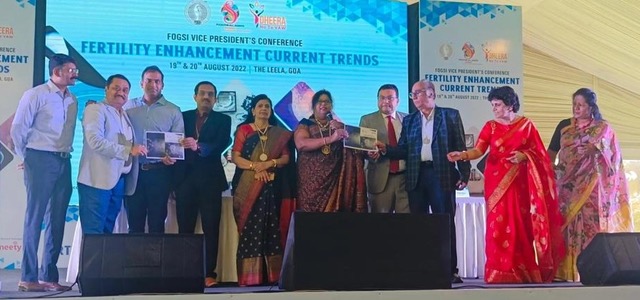Bringing good health to Rh-negative mothers and newborns…, Goa: The Federation of Obstetric and Gynecological Societies of India (FOGSI), released the key practice points for the need for anti-Rh(D) immunoglobulin for treatment of Hemolytic disease of the foetus and newborn (HDFN), today. The guidelines that were released at the FOGSI Conference, is a significant step towards strengthening women’s health in India by ensuring safer deliveries. The objective of this guideline is to provide healthcare professionals with practical guidance on the use of anti-D immunoglobulin as immunoprophylaxis to prevent sensitization to the D antigen during pregnancy or at delivery for the prevention of HDFN.
During pregnancy, rhesus D (Rh) D-negative women who carry an Rh D-positive fetus are at risk of being sensitized to produce immune anti-D antibodies. While the first baby is not much affected by this, in the subsequent pregnancy, if the baby is Rh positive, complications can occur. The antibodies that the mother had developed during her first pregnancy get passed on to the baby and start attacking the red blood cells(RBCs) of the baby that have the Rh factor. RBCs break down and this is called hemolysis and this can cause anemia and heart failure among other problems.
Speaking at the conference, Dr Shanthakumari, President- FOGSI & Lead on the Expert Committee stated, “Almost 5% of women in India are Rh negative. Further, a hospital-based study reported an overall incidence of Rh alloimmunization to be 10.7% and 0.12% in Rh-negative and Rh-D positive mothers, respectively. With advancements in science, today we can bring good health to both mothers and their newborn. Research reveals that the prophylaxis with anti‐D immunoglobulin effectively reduces the risk of sensitization in the subsequent pregnancy of Rh-negative mother irrespective of the ABO status of mother and baby.”
She added, “However, despite the availability and use of Anti-D, the burden of Rh disease continues. This emphasizes the need for adherence to guidelines and practice points among practitioners. The guidelines recommend a Flowchart for the prophylactic use of Rh D immunoglobulin in pregnancy care. We are confident that this will be a significant step towards ensuring safer and healthier deliveries.
Some of the expert recommendations include:
• Blood group, Rh status & ICT must be done at 1st booking. If ICT is negative, it should be repeated at 28 weeks. (Good practice point)
• The dosage of Anti-D prior to 20 weeks is 150mcg IM deltoid, and post 20 weeks is 300mcg IM deltoid. If 150 mcg is not available, then 300 mcg should be given. (Good practice point)
• RAADP should be offered to all non-sensitized RhD-negative women. (Grade B, Evidence level 2++)
• Routine administration of 300mcg of Anti-D must be given at 28 weeks in Rh-negative mother after doing ICT. (Good practice point)
• The prophylaxis with anti-D immunoglobulin effectively reduces the risk of sensitization in the subsequent pregnancy irrespective of the ABO status of the mother and baby. (LEVEL I C)
• Blood group identification and Rh D typing should be performed on the cord or placental vessel. (LEVEL I C)
• Maternal administration of anti-D prophylaxis within 72 hours of delivery with an Rh D-positive newborn, unless already sensitized. (LEVEL I C)
About FOGSI
The Federation of Obstetric and Gynaecological Societies of India (FOGSI) is a professional organization representing practitioners of obstetrics and gynecology in India. With 262 member societies and over 37,000 individual members spread over the length and breadth of the country, FOGSI is probably one of the largest membership-based organizations of specialized professionals.
FOGSI exists to encourage and disseminate knowledge, education, and research in the field of obstetrics and gynecology, to pilot and promote preventive and therapeutic services related to the practice of obstetrics and gynecology for the betterment of the health of women and children in particular, and the wellbeing of the community in general, to advocate the cause of reproductive health and rights and to support and protect the interest of practitioners of obstetrics and gynecology in India. For further information, visit https://www.fogsi.org/



